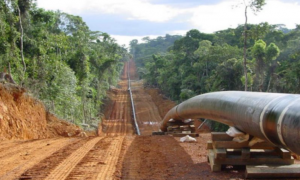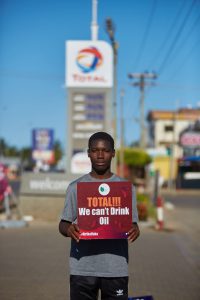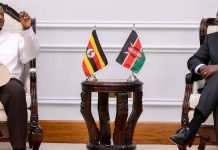Reported by
Faridah N Kulumba
Africa-Press – Uganda. This week on Tuesday, climate activists marked Africa Day by staging protests at Total’s petrol stations in African countries, including Uganda, Kenya, Benin, Togo, Democratic Republic of Congo, Egypt, Ghana and Nigeria. According to the article published by OPO Group, the protests highlighted Total’s human rights violations, green-washing strategies and climate inaction.
The protesters are accusing Total of involving in controversial projects across African continent, notably the East African Crude Oil Pipeline (EACOP) and the Mozambique Liquefied Natural Gas (LNG) project that have witnessed displacement of people from their land as well as several human rights abuses.
Total Origin
Total is a French multinational integrated oil and gas company and one of the seven super major oil companies, founded in 1924. Its businesses cover the entire oil and gas chain, from crude oil and natural gas exploration and production to power generation.
Total is the leading petroleum product retailer in Africa, with a network of more than 4,000 service stations. And it aims to grow its market share from 17% in 2015 to more than 20%. The company is expanding on the continent with the acquisition of Gulf Africa Petroleum Corporation’s (GAPCO) assets in Uganda, Kenya and Tanzania.
About Total Uganda Limited

Total Group has been in Uganda since 1955 through the Marketing and Services division for which it is the market leader with over 129 fuel stations, and lubricant, LPG aviation fuel and general retail businesses. It has an estimated market share of 22%.
In 2010, Total also established an exploration and production affiliated Total E&p Uganda, which began operations, in the Lake Albert region district in February 2012. In Uganda Total is leading the development activities towards production in the Tilenga project area based in Murchison Falls National Park.
About Total Kenya Limited,this was created in 1955. It is a 92.3% owned Total affiliate listed on the Nairobi Securities Exchange with a workforce of 394.
Total Kenya is active across the marketing chain, with a retail network of 181 service stations and lubricant, LPG, aviation fuel, general retail and wholesale businesses, and it has an estimated market share of 20%.
In Egypt, Total’s activities mostly involve in marketing products and service, and in the last few years, they also branched out into exploration and photovoltaic solar power, with 240 service stations.
Total in Egypt also lead environmental and community outreach initiatives in the country to promote culture and heritage, health, community support and education.
Total damages to African environment

Earlier in this year, more than 260 African and international organisations sent an open letter to 25 banks urging them not to finance the construction of the East African Crude Oil Pipeline.
The #StopEACOP Alliance went ahead to issue a statement (bit.ly/3vonX7Q) clarifying several misleading figures presented by Total such as the number of oil wells to be drilled within Murchison Falls National Park, and the number of project-affected people for Tilenga and EACOP.
Andre Moliro, Democratic Republic of Congo activist said Total’s fossil fuel developments pose grave risks to protected environments, water sources and wetlands in the Great Lakes and East Africa regions
He added that communities have been raising concerns on the impact of oil extraction on Lake Albert fisheries and the disastrous consequences of an oil spill in Lake Victoria, that would affect millions of people that rely on the two lakes for their livelihoods, watersheds for drinking water and food production.
Vanessa Nakate, a Ugandan activist told OPO Group that the East African Crude Oil Pipeline is going to cause massive displacement of people, destruction of ecosystems and wildlife habitats.
“We cannot drink oil. This is why we cannot accept the construction of the East African Crude oil pipeline. It is going to cause massive displacement of people, destruction of ecosystems and wildlife habitats. we have no future in extraction of oil because it is only means destroying the livelihoods of the people and planet. It is time to choose people above pipelines,” Nakate said.
Total seeks to position itself as a climate leader but chooses to ignore the massive climate risks posed by going ahead with its fossil fuel projects across Africa.
Total’s reaction
Total issued statements on its website describing its environmental and social risk assessment and mitigation strategies for the EACOP and Tilenga oil extraction project as “rigorous” and calming to act “responsibly and transparently” on the social and environmental issues related to the projects.
Total is a Paris oil company, the nation which signed a legal binding international treaty on climate change. Its goal is to limit global warming to well below 2, preferably to 1.5 degrees Celsius, compared to pre-industrial levels.
African Development Bank Group Policy on environmentally sustainable development
African Development Bank Group Policy on environmentally sustainable development in Africa, is based on assessment of environmental constraints and opportunities that affect medium and long-term development objectives across the continent.
It sets out the broad strategic and policy framework under which all Bank lending and non-lending operations will henceforth be made.
In addition, it serves to guide policy and decision making in those key sectors that depend upon the utilisation of natural resources.






